Introduction
- Diabetes is one of the terminal conditions affecting many people today.
- Sedentary lifestyles and unbalanced diets are critical risk factors.
- It currently affects both children and adults.
- Healthcare professionals should collaborate to empower such patients.
- Effective leadership can result in successful diabetes management.
- This presentation summarizes the completed Nursing Leadership Project Proposal.
Nurses can collaborate and apply evidence-based strategies to empower their diabetic patients. The involvement of all key stakeholders is also necessary. Those in leadership positions should guide their followers and patients to manage this condition successfully.
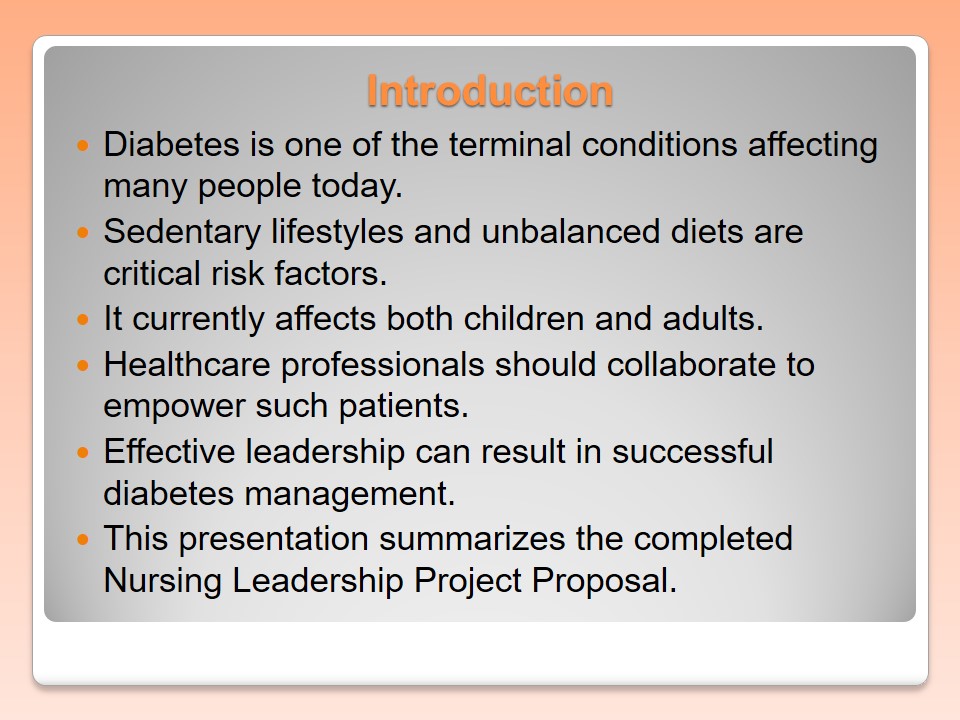
Project Description
- Leadership and management will result in effective diabetes management.
- Nurses can present superior policies to analyze this issue.
- Those who take up leadership roles find it easier to enhance patients’ experiences (McGill et al., 2017).
- Empowered individuals will record positive health outcomes.
- Institutions can consider the importance of better leadership policies.
- These measures will support the treatment and prevention of diabetes.
Clinical complexity of diabetes is closely linked to the nature or level of leadership or management. The targeted project seeks to examine how additional policies focusing on nursing leadership can transform the lives of more diabetic patients. Those who improve their leadership competencies can improve the management of this condition.
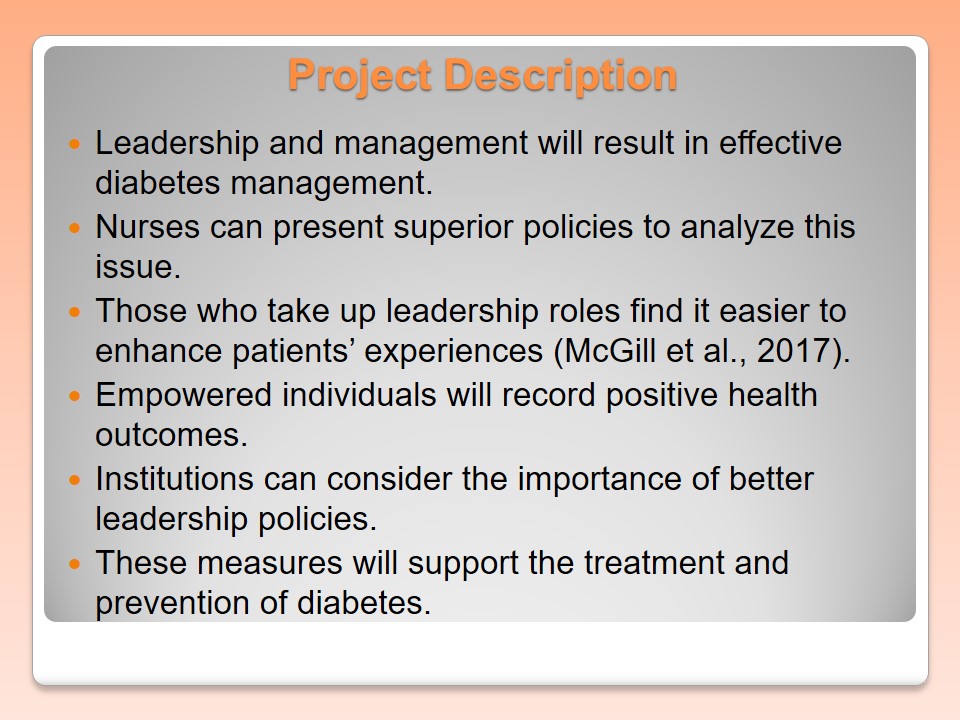
Cont
- The first importance of leadership is that is guides policy formulation.
- Those who embrace the idea will take diabetes management to the next level.
- The concept of leadership encourages nurses to be involved in decision-making (Zhong, Wang, Fisher, & Tanasugarn, 2015).
- The end result is that new ideas will emerge.
- More patients will eventually record positive health outcomes.
- The United States’ health industry will also change significantly.
The concept of leadership is essential since it maximizes the participation of different stakeholders in policymaking processes. The issue of diabetes can benefit significantly from this kind of practice. This is possible since nurses can be part of decision-making and support the implementation of new policies that can result in improvement procedures for diabetes prevention and management.
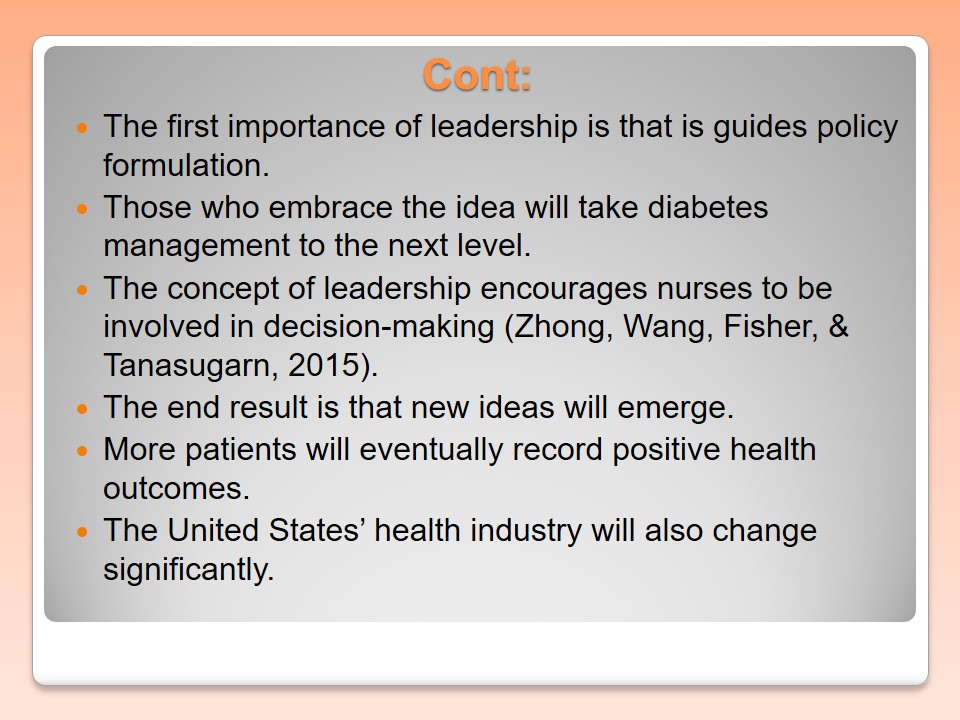
Project Rationale
- The targeted project seeks to introduce the idea of leadership in diabetes management.
- The completed study will present beneficial information to health leaders.
- Nursing staff will also acquire additional ideas and insights (Mohan, Cooper, Matthews, & Khunti, 2019).
- Professionals working with diabetic patients will achieve their goals much faster.
- Nurses will understand or be involved in decision-making.
- Superior ideas for transforming patient care will emerge.
The intended study seeks to focus on a critical area that many stakeholders have continued to take for granted. The completed research is intended to empower and guide more nurses and health managers to transform the outcomes of patients with diabetes.
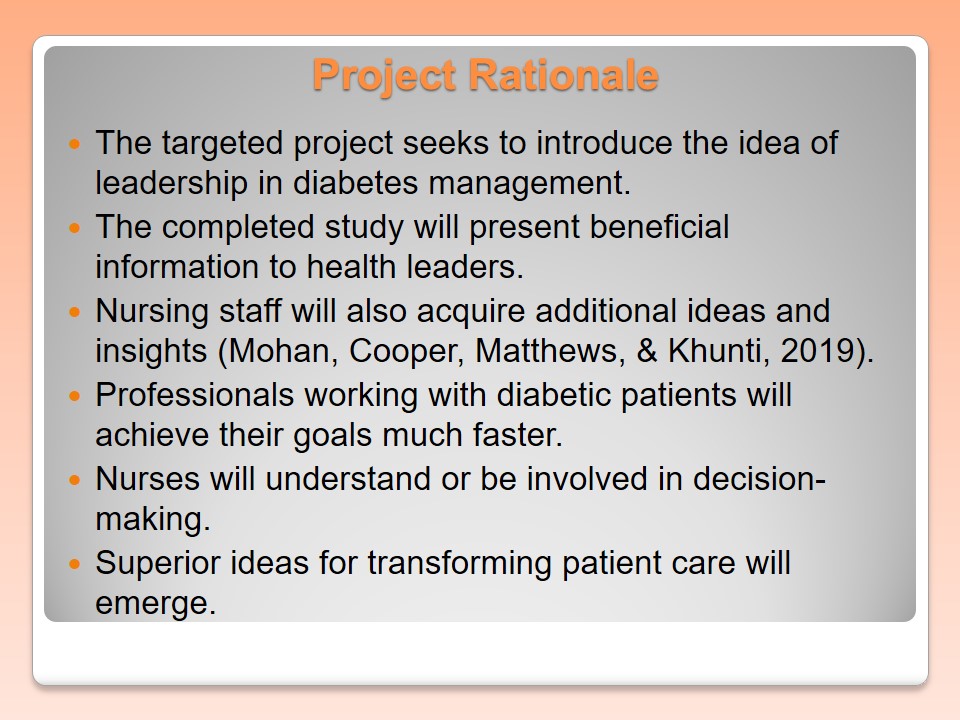
Expectations
- The completed study will expand my knowledge in nursing leadership.
- I will understand how leadership can support the management and prevention of diabetes.
- The work will empower me to learn more about proper diabetes management (Zhong et al., 2015).
- These insights will make it possible for me to prevent diabetes.
- I will also apply the acquired ideas to support my health needs.
- These gains will transform the entire healthcare sector.
After completing this study, I will acquire evidence-based concepts and ideas for preventing and managing diabetes. This knowledge will be applicable to both patients and clinicians. I will consider the importance of lifelong learning to acquire additional skills in this field. The achievements will result in new improvements in the field of diabetes.
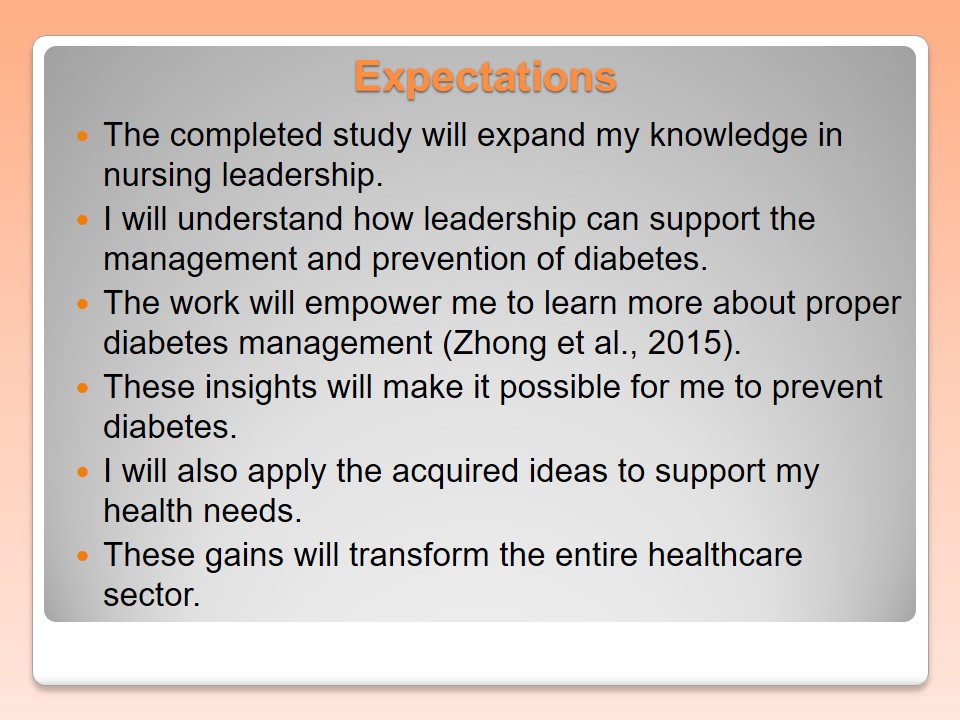
Project Goals
- This project seeks to determine how leadership determines diabetes management.
- It will present additional ideas for including nurses in policy formulation.
- It will offer new strategies for improving decision-making.
- It will present additional ideas for managing and controlling diabetes.
- It will offer new concepts for empowering leaders and institutional managers (Zhong et al., 2015).
- Such gains will revolutionize the management of this chronic condition.
Secondary and primary data collection methods will be used during the study. The primary approach will entail the use of questionnaires while the secondary one will be the use of desktop research. These strategies will ensure that these goals are realized and used to inform diabetes management procedures.
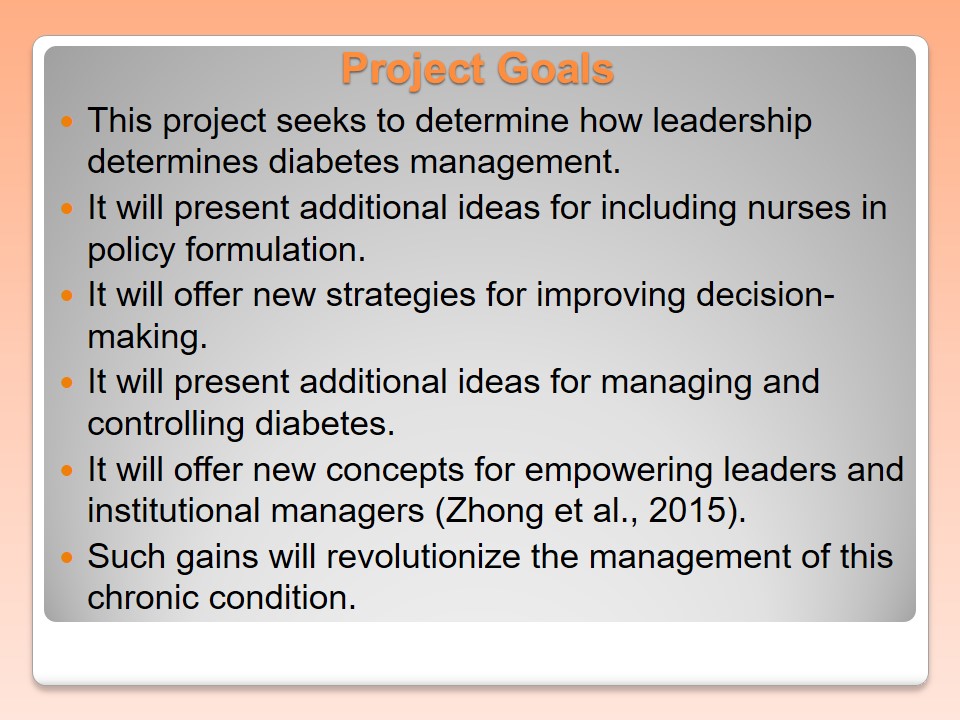
Literature Review
- Diabetes affects around 9.4 percent of the U.S. population today (World Health Organization, 2016).
- It is one of the commonest lifestyle conditions.
- Those who have diabetes require long-term care and support.
- Healthcare professionals should be monitored and supported by healthcare professionals.
- These strategies will make it possible for people to lead high-quality lives.
- This means that such professionals should possess appropriate competencies.
Many people in the U.S. and across the globe are affected by this epidemic. This terminal condition requires the support of existing private and public health institutions. Healthcare professionals should be involved to find long-lasting solutions to this condition (Mohan et al., 2019). The availability of evidence-based practices will support the management of this condition and empower more patients.
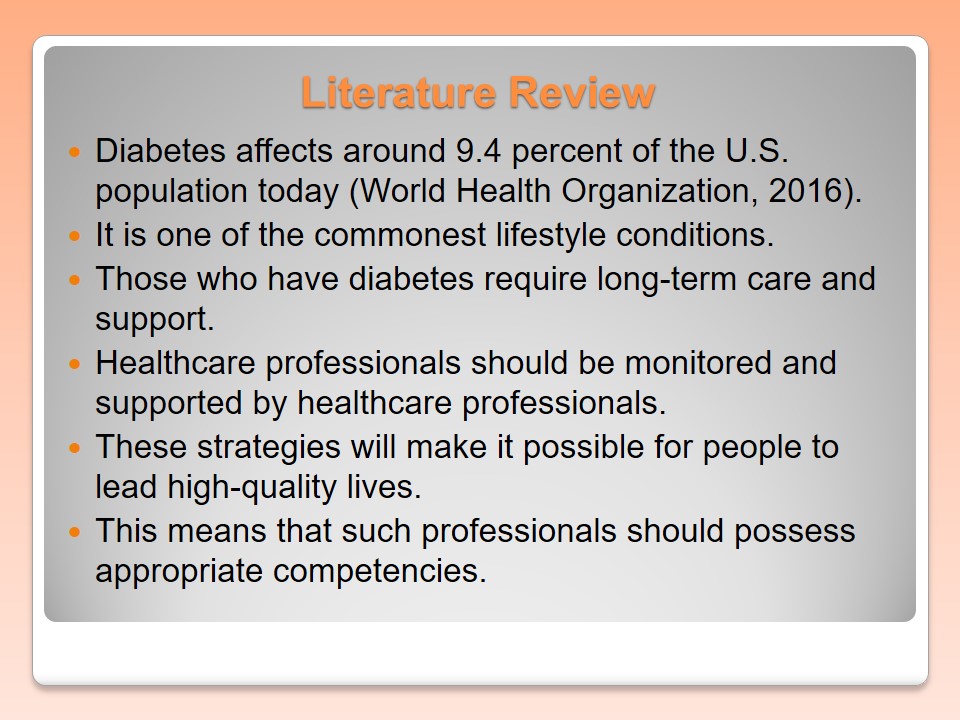
Procedure
- Several steps will be considered to deliver positive results.
- The first one will be to get appropriate materials and resources.
- This will be realized through desktop research or study.
- The Internet will be instrumental in presenting the intended information.
- The data will be analyzed and then condensed.
- This approach will ensure that superior insights and ideas are acquired.
Desktop research will be conducted to get adequate information for developing the intended Literature Review section. The use of online materials will support the exercise and make it successful.
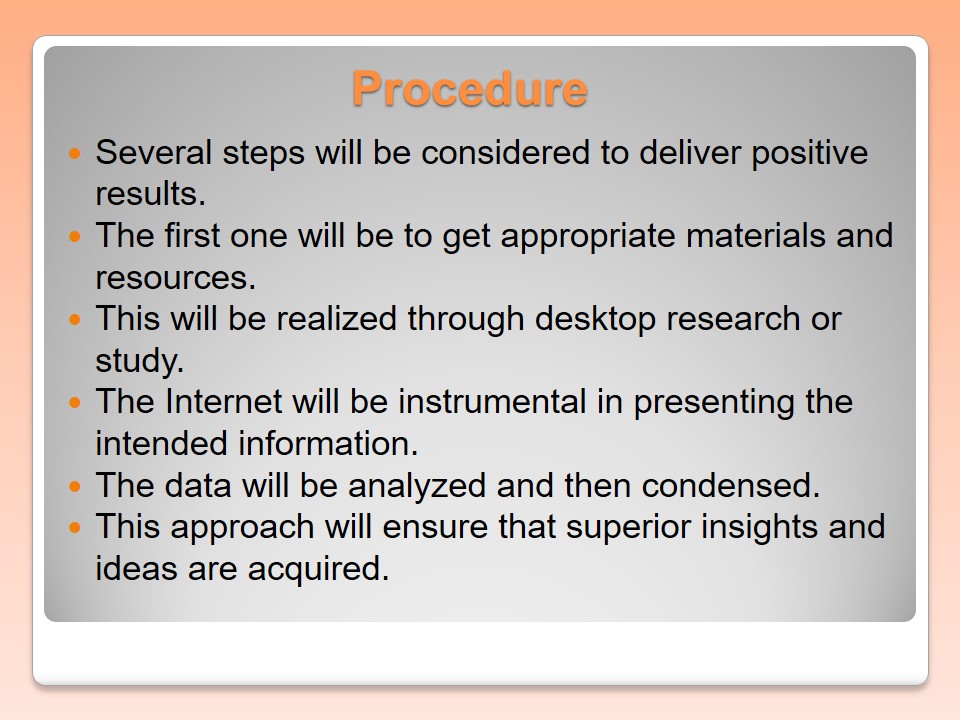
Cont
- The second step is that of primary research.
- Interviews and roundtable discussions will be completed within three days.
- Three hospitals will be considered for this study.
- The third step is to analyze the collected data objectively (Mohan et al., 2019).
- This will be followed by writing the final report.
- Around $500 will be required for the successful completion of this study.
The use of a primary study approach will ensure that timely information is gained from different interviewees. The respondents are expected to present high-quality information that can support the presentation of applicable ideas and concepts in the management and prevention of diabetes. The projected expenditure for the entire project will be around $500. Its successful completion will offer high-quality ideas for introducing effective leadership practices and procedures in the field of diabetes and empower more patients.
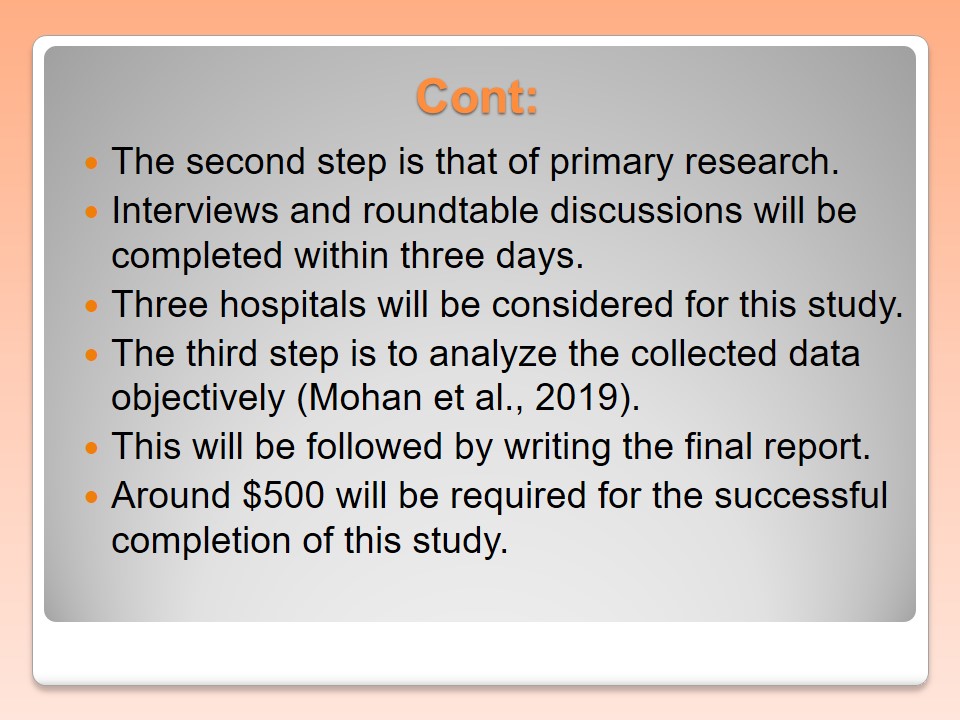
Conclusion
- The success of this project will be determined by the number of participants.
- The inclusion of more interviewees means quality results.
- The successful completion will expand the current knowledge in this field.
- More stakeholders will acknowledge why this problem exists.
- New ideas will emerge for transforming the care available to diabetic patients.
- This means that the effectiveness of the healthcare sector will increase.
The suggested project is essential since it will present additional ideas for empowering more patients with diabetes. Clinicians, nurses, and health managers will appreciate emerging approaches for engaging stakeholders in decision-making and policymaking processes.
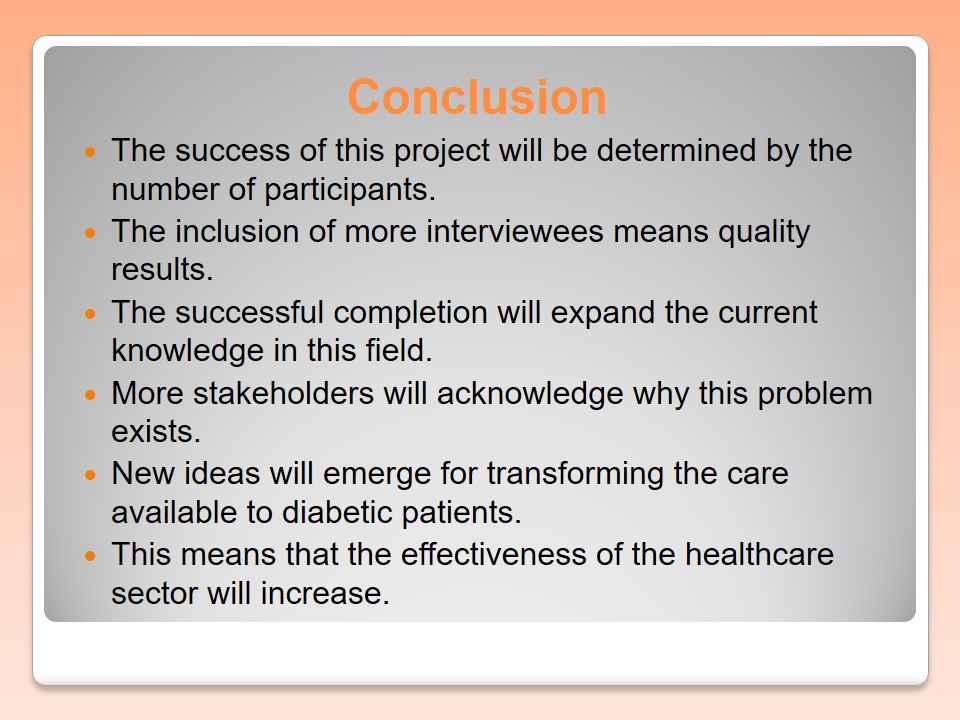
References
McGill, M., Blonde, L., Chan, J. C. N., Khunti, K., Lavalle, F. J., & Bailey, C. J. (2017). The interdisciplinary team in type 2 diabetes management: Challenges and best practice solutions from real-world scenarios. Journal of Clinical and Translational Endocrinology, 7, 21-27. Web.
Mohan, V., Cooper, M. E., Matthews, D. R., & Khunti, K. (2019). The standard of care in type 2 diabetes: Re-evaluating the treatment paradigm. Diabetes Therapy, 10(1), 1-13.
World Health Organization. (2016). Global report on diabetes. Geneva, Switzerland: WHO.
Zhong, X., Wang, Z., Fisher, E. B., & Tanasugarn, C. (2015). Peer support for diabetes management in primary care and community settings in Anhui province, China. Annals of Family Medicine, 13(1), S50-S58. Web.